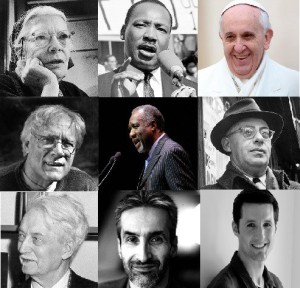 By Sam Tomlin
By Sam Tomlin
For the last year so or, a group of mainly South London Citizens members have been gathering every 2-3 months at William Booth College for a reading group looking at theology, community organising and justice. It has been an immensely enriching experience and a chance to look in a bit more detail at some of our collective heroes of the faith and unpack their motivations, influences, agitational activity, frustrations and reliance on God.
On a personal level I have learnt a huge amount both from reading the books and the discussion with other members of Citizens institutions at the different discussion groups. Three things in particular stand out to mention briefly:
1) The fight for justice is an immensely spiritual affair in a way that transcends the traditional ‘liberal-conservative’ theological spectrum, reminding me of words I read as a teenager which have remained with me ever since in Shane Claiborne’s Irresistible Revolution: ‘some folks end up end up trying to save individual souls from their sins, and others end up trying to save the world from “the system”. But rarely do we see that the sickness of our world has infected each of us, and that the healing of our world not only begins within us but does not end with us.’ Structural oppression and injustice has a deeply spiritual foundation which justice seekers so often miss. Prayer, worship and desperately seeking after God is central to justice-seeking.
2) It is vital to link national (or international) issues of justice to local issues. In the organising I have been involved in, it has at times felt futile to seek change when the injustice faced is so huge and interlinked with the way our country’s economic structure has been established for example. Reading Dorothy Day in particular reminded me of how important it is to love individual people as I encounter them in my community alongside working for more systemic change in the community and wider society. Indeed, the latter is deeply informed by the former.
3) The joy of ecumenism and learning from other traditions. I am a Salvationist and I am proud of the rich heritage and justice-seeking history that the Salvation Army has (expounded in Marching Towards Justice). I believe our tradition has something unique and wonderful to contribute to the global church witness, but I also believe that as Salvationists we can learn and be built up by some of the wisdom gathered over centuries by other church traditions and it has been a joy to consider authors from the Roman Catholic, Pentecostal and Baptist traditions in our reading so far. We look forward to exploring other traditions in coming months.
Below is a list and very brief summary of the different books we have read. I can wholeheartedly recommend each of them to you (try and avoid tax-avoiding booksellers if you can!)
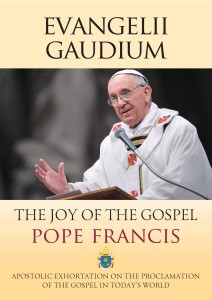 Evangelii Gaudium (The Joy of the Gospel) – Pope Francis
Evangelii Gaudium (The Joy of the Gospel) – Pope Francis
An apostolic exhortation by Pope Francis published not long after he became Pope. Adds to and comments on the long tradition of Catholic Social Teaching, and as such discusses a theological understanding of how society is best structured, how the market and state interact and the church’s role within society.
Quote: ‘We should recognize how in a culture where each person wants to be bearer of his or her own subjective truth, it becomes difficult for citizens to devise a common plan which transcends individual gain and personal ambitions.’ This is our challenge as organisers.
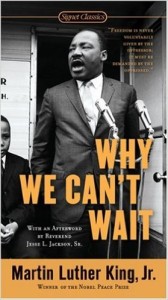 Why we can’t wait – Martin Luther King Jr.
Why we can’t wait – Martin Luther King Jr.
A book concerning the nonviolent civil rights movement by Martin Luther King Jr, and in particular the 1963 Birmingham campaign. Includes the famous ‘Letter from Birmingham Jail’ where MLK powerfully outlines the cry of justice from the oppressed and challenges the inaction of churches elsewhere across America. Expounds the importance of nonviolent resistence as an expression of the gospel of Christ.
Quote: ‘The question is not whether we will be extremists, but what kind of extremists we will be. Will we be extremists for hate or love? Will we be extremists for the preservation of injustice or for the extension of justice?’
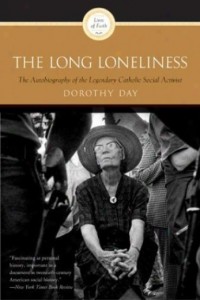 The Long Loneliness – Dorothy Day
The Long Loneliness – Dorothy Day
Personal reflection by Dorothy Day on her life and the establishment of the Catholic Worker Movement in the USA in the mid 20th century. Example of voluntary poverty as an expression of solidarity with the poor and the reality that taking up one’s cross means true self-sacrifice. A fascinating discussion of the strengths and weaknesses of Christian socialism in its many forms.
Quote: ‘Going around and seeing such sights is not enough. To help the organizers, to give what you have for relief, to pledge yourself to voluntary poverty for life so that you can share with your brothers [and sisters] is not enough. One must live with them, share with them and their suffering too. Give up one’s privacy, and mental and spiritual comforts as well as physical.’
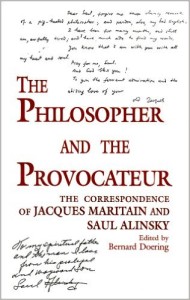 Philosopher and the Provocateur – Letters between Saul Alinsky and Jacques Maritain
Philosopher and the Provocateur – Letters between Saul Alinsky and Jacques Maritain
Correspondence between the founder of community organising in America, Saul Alinsky and his friend and theologian/philosopher Jacques Maritain, discussing life, organising and theology mainly. Reminded me in particular of the importance of deep friendships within justice-seeking and how people with different passions and gifts (Maritan the reflective theologian, and Alinsky the energetic activist) can work together.
Quote: ‘In a democracy which has come of age in a society of free men [and women], expert in the virtues of freedom and just in its fundamental structures, the work of such prophets would be integrated into the normal and regular life of the body politic and issue from the people themselves, or from the free common activity of the people in their most elementary, most humble local communities.’ Maritain commenting on Alinsky’s work.
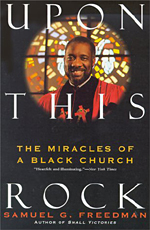 Upon this Rock: The Miracles of a Black Church – Samuel G Freedman
Upon this Rock: The Miracles of a Black Church – Samuel G Freedman
Journalist Samuel Freedman documents his time with the inspiring church leader, Johnny Ray Youngblood leading a church in 1980’s downtown New York with all the challenges of poverty, racism and inner city life. Of particular interest is the use of community organising as a tactic to tackle many of the issues explored.
Quote: ‘Every time I see a man put down his bottle, there’s a resurrection goin’ on. Every time I see a man go back to school, there’s a resurrection goin’ on’ – Johnny Ray Youngblood
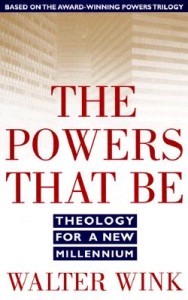 The Powers that be – Walter Wink
The Powers that be – Walter Wink
Theological exploration of the spirituality of justice seeking. Wink suggests that all institutions, systems or organisations have ‘spirits’ as the unseen power behind the visible elements, and it is the task of the church to engage with those powers, bringing them back to where God intended them to be. Linked to this, there is a discussion on the theology of pacifism and just war theory and the ‘myth of redemptive violence’.
Quote: ‘The Powers That Be are more than just the people who run things. They are the systems themselves, the institutions and structures that weave society into an intricate fabric of power and relationships. The Powers surround us on every side. They are necessary. They are useful. … But the Powers are also the source of unmitigated evils.’
 The group have also looked at Luke Bretherton’s book: Resurrecting Democracy – Faith, Citizenship and the politics of a Common Life, but I was sadly away for this group and have not had a chance to read it properly. I have heard good things about it though and it is on my future reading list!
The group have also looked at Luke Bretherton’s book: Resurrecting Democracy – Faith, Citizenship and the politics of a Common Life, but I was sadly away for this group and have not had a chance to read it properly. I have heard good things about it though and it is on my future reading list!
If you live in London and are interested in getting involved, do get in touch and we can give you the details of the next book and dates when we get together.
